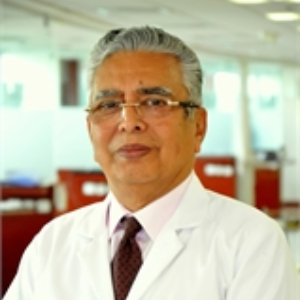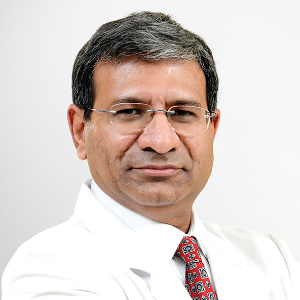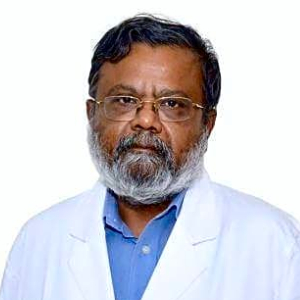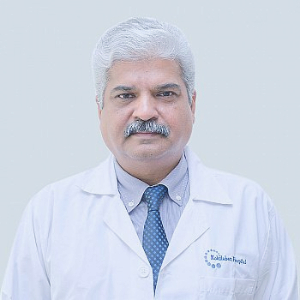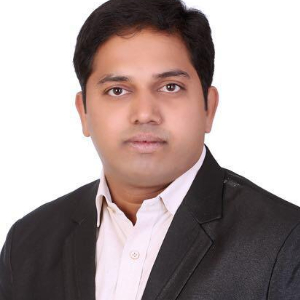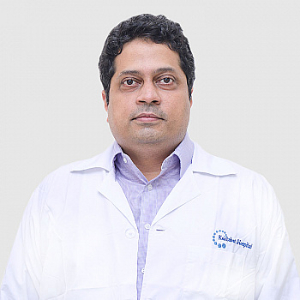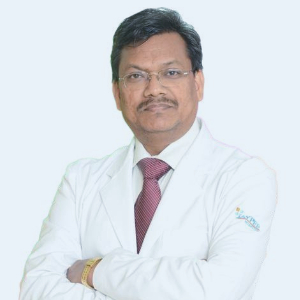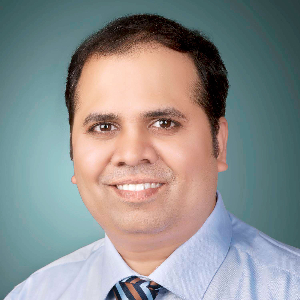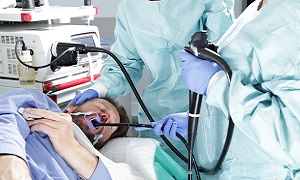Best Doctors in India for Throat Cancer treatment
- Radiation Oncologist, Gurugram, India
- Over 40 years’ experience
Profile Highlights:
- Dr. Subodh Chandra Pande is a well-known radiation oncologist in India. He has a long and rich clinical and teaching experience in the specialty of radiation oncology.
- He included a Dual Energy Linear Accelerator with Multi-Leaf Collimator at Bhagwan Mahaveer Cancer Hospital and Research Centre (BMCHRC), Jaipur & which was a first for the State of Rajasthan.
- (Surgical Oncologist) Plastic surgeon, New Delhi, India
- Over 33 years' experience
Profile Highlights:
- Dr. Sandeep Mehta is a renowned Head and Neck Onco Surgeon who specializes in Plastic and Microvascular Reconstructive surgery.
- He has over three decades of experience in the field and performs Robotic and Laparoscopic surgeries for cancers of the head and neck.
- He has advanced training in Maxillofacial Bioengineered tissue synthesis and reconstruction and therefore performs all kinds of cancer surgery affecting the head and neck regions.
- ENT, Head & Neck Surgeon, Gurugram, India
- Over 20 years’ experience
Profile Highlights:
- Dr. Shashidhar TB is known as an exceptionally talented, hard-working, and dedicated consultant for ENT, head and neck surgery who has years of experience in handling challenging cases.
- His interests include airway reconstruction, treating swallowing disorders, sleep apnea surgery, general ENT along with pediatric ENT. He has also been the runner-up in the International Pediatric Otolaryngology conference for Best Paper Award.
- Thoracic Onco Surgeon, New Delhi, India
- Over 30 years’ experience
Profile Highlights:
- Dr. Sabyasachi Bal specializes in Thoracic Onco surgery and provides treatment for lung cancer, chest cancer, and other types of thoracic malignancies.
- He has over 30 years of experience in the field and has reformed thoracic cancer surgery in India. He has also added Robotic Thoracic Surgery to his list of specializations.
- Dr. Sabyasachi Bal’s primary focus lies in the management and treatment of cancers affecting the thoracic regions and organs near the lungs and chest of both adolescents and adults.
- Surgical Oncologist, Mumbai, India
- Over 35 years’ experience
Profile Highlights:
- With over 35 years of experience, Dr. Rajesh Mistry is one of the best surgeons for Thoracic and Head & Neck Surgeries.
- He is an expert in performing all types of head and neck cancer surgeries including the thoracic region and has performed more than 700 thoracic onco-surgeries, 350 minimally invasive surgeries, 350 open surgeries, 200 Lobectonomies, 250 Esophagectomies, and more than 40 Robotic surgeries for Head and Neck related cancers.
- ENT, Head & Neck Surgeon; Gurugram, India
- Over 15 years’ experience
Profile Highlights:
- Dr. Anish Gupta is a renowned ENT specialist and Head & Neck Surgeon in Delhi/ NCR.
- He has extensive experience in performing common and complex ENT procedures including ontological and rhinological procedures, laryngeal framework procedures, endoscopic sinus surgery, cochlear implant, thyroidectomy, and surgical treatment for head and neck tumors.
- Dr. Anish Gupta has been involved in more than 100 cochlear implant surgeries.
- Surgical Oncologist, Hyderabad, India
- Over 10 years’ experience
Profile Highlights:
- Dr. Girish Kumar is a Surgical Oncologist whose expertise lies in the surgical treatment of both adult and pediatric cancer and provides services for head and neck, breast, GI, bone and soft tissue, urological, colorectal, and gynecological cancers.
- Along with the surgical treatment of various types of cancers, Dr. Girish Kumar also provides pre and post-operative cancer care.
- He has also trained a number of medical students in surgical oncology and continues to mentor postgraduate students.
- Surgical Oncologist (Breast & Colorectal), Mumbai, India
- Over 20 years’ experience
Profile Highlights:
- Dr. Mandar Nadkarni is a well-known name in the field of Breast onco-surgery in India and has performed more than 8000 breast surgeries for cancer patients in 20+ years of experience.
- Dr. Nadkarni has also performed over 500 oncoplastic procedures that include therapeutic mammoplasty as well as whole breast reconstruction. He also holds the credit for more than 100 hook wire localization for impalpable lesion procedures.
- Surgical Oncologist, New Delhi, India
- Over 20 years’ experience
Profile Highlights:
- Dr. Pawan Gupta is a well-known Surgical Oncologist in India having more than 2 decades and has performed over 7000 onco-surgeries for head and neck, thoracic, breast, GI, and gynecological cancers.
- Dr. Pawan Gupta is highly trained in different types of cancer surgeries and received his training from the best Cancer centers including Tata Memorial Hospital and SMH Curie Cancer Center.
- Surgical Oncologist, Mumbai, India
- Over 10 years’ experience
Profile Highlights:
- Dr. Prashant Pawar is a reputed Head and Neck Onco-surgeon.
- He possesses 10+ years of experience in the field and is an expert in the treatment of benign and malignant tumors of the head and neck.
- Dr. Prashant Pawar’s primary expertise lies in Voice rehabilitation post Laryngectomy among other surgeries for cancers of the head and neck regions. He performs both open and endoscopic surgeries and is also an expert in laser surgery and minimally invasive procedures.
Best Hospitals in India for Throat Cancer treatment
CARE Hospitals, Hyderabad
- City: Hyderabad, India
Hospital Highlights:
- CARE Hospitals were established in the year 2000, by CARE Group.
- The multispecialty hospital has 435 beds, including 120 critical care beds, with an annual inflow of 180000 outpatients and 16,000 in-patients.
- The hospital provides specialty medical services in Cardiology, Cardiothoracic Surgery, Pediatric Cardiology, Pediatric Cardiothoracic Surgery, Neurology, Neurosurgery, Nephrology, and Urology.
- The hospital has the first dual source, 128 slice CT scanner (for high precision cardiac imaging) – the first of its kind in south India.
- The hospital offers a wide range of accommodation facilities for the convenience of its varied patient base, ranging from general wards to super deluxe rooms.
Fortis Hiranandani Hospital, Mumbai
- City: Mumbai, India
Hospital Highlights:
- Fortis Hiranandani hospital was established in 2007.
- The hospital is an advanced tertiary care, multi-specialty hospital equipped with 149 beds.
- The hospital is equipped with a super ICU to provide emergency medical care to critically ill patients.
- The hospital is NABH accredited.
- The critical care facility in the hospital is augmented with the state-of-the-art facilities that facilitate speedier diagnosis and efficient monitoring.
- The hospital provides specialty medical services in cardiology, orthopedic science, pediatric science, neurology, diabetic care, urology, nephrology, ENT, obstetrics, gynecology, cosmetic surgery, bariatric surgery, neuro and spine care.
Fortis Hospital, Anandpur, Kolkata
- City: Kolkata, India
Hospital Highlights:
- Fortis Hospital, Anandapur, Kolkata is a world-class super-speciality equipped with the latest technologies in the medical world.
- The hospital is NABH accredited.
- This state-of-the-art facility specializes in cardiology and cardiac surgery, urology, nephrology, neurosciences, orthopaedics, digestive care, emergency care and critical care.
- The hospital, governed by integrated Building Management System (IBMS), has a pneumatic chute system, for quick vertical and horizontal transportation between floors, facilitating speedy transfer of patient specimens, documents, reports, and medicines to the concerned departments.
- The hospital also has a nephrology department with over 28 advanced dialysis units.
Fortis Hospital Banerghatta, Bengaluru
- City: Bengaluru, India
Hospital Highlights:
- Fortis Hospital Bannerghatta, Bengaluru was established in 2006.
- The hospital is a 276 bedded multi-specialty tertiary care facility.
- The hospital specializes in cutting-edge medical technology and dedicated patient care services.
- The hospital is equipped with state-of-the-art technologies like trans-radial angioplasty, trans-abdominal cardiac surgery, and computerized TKR navigation surgery.
- The hospital provides specialty medical services in cardiology, cardiac surgery, orthopedics, neurology, neuro-surgery, GI, and Minimal Access Surgery (MAS).
Gleneagles Global Hospital, Parel, Mumbai
- City: Mumbai, India
Hospital Highlights:
- Gleneagles Global Hospital The 450-bed facility comprises of 17-stories, housing state-of-the-art infrastructure, and advanced medical care facilities.
- The hospital offers end-to-end clinical, surgical, and diagnostic services. It is equipped with a team of eminent medical professionals aided by qualified nurses and medical staff
- The Hospital offers advanced Endoscopic procedures, Hepatobiliary and Liver Surgeries, Surgical and Medical Gastroenterology, Bariatric Surgery, and Robotic surgery.
- The hospital is a center of excellence for Orthopedics, Joint Replacement, Knee Replacement, and Hip Replacement surgery.
Jaypee Hospital, Noida
- City: Noida, India
Hospital Highlights:
- Jaypee Hospital is the flagship hospital of the Jaypee Group.
- This hospital has commissioned 525 beds in the first phase and has been planned and designed as a 1200 bedded multi-specialty facility.
- It holds the accreditation of the NABH and NABL.
- The hospital has state-of-the-art infrastructure equipped with the latest technologies and modern equipment like 64 Slice PET CT, Dual Head 6 Slice SPECT CT, Gamma Camera, and Da Vinci Robotic Surgery for comprehensive robotic surgical solutions.
- It has special Centers dedicated to the major specialties to provide hassle-free and high-quality clinical care.
Manipal Hospital, Dwarka, Delhi
- City: New Delhi, India
Hospital Highlights:
- Manipal Hospitals, Dwarka, is a super-specialty hospital in Dwarka, New Delhi, which is a part of Manipal Hospitals Group.
- The hospital aims to provide the best treatment on par with international standards at a fraction of the cost.
- Equipped with 380 beds, the hospital is also one of the new age hospitals which are equipped fully with state-of-the-art infrastructure, cutting-edge technology as well as the latest and advanced clinical practices. The hospital also has 13 modular Operation theatres with 118 beds which are solely meant for critical care.
- The hospital comprises internationally acclaimed doctors and highly professional and experienced hospital and medical staff who are able to provide preventive, therapeutic, and diagnostic services all under one roof.
Pushpawati Singhania Hospital & Research Institute, New Delhi
- City: New Delhi, India
Hospital Highlights:
- Established in 1996, Pushpawati Singhania Research Institute is one of the top hospitals in the NCR region, as well as one of the top facilities in India for gastroenterology. The hospital is one of South Asia’s first institutes in medical and surgical treatment for diseases related to digestion.
- The hospital is equipped with state-of-the art facilities coupled with the latest equipment as well as renowned consultants from various parts of India as well as other parts of the world.
W Pratiksha Hospital, Gurgaon
- City: Gurugram, India
Hospital Highlights:
- W Pratiksha Hospital, Gurugram, is one of the best hospitals in the NCR region. It is also a top hospital in India for IVF. Since its inception, the hospital has performed over 5500 successful IVFs. The hospital also specializes in gynecology.
- With over 20 years of experience in providing quality healthcare, the hospital is known as one of the most trusted and valued health providers in India.
- Equipped with world-class medical facilities and advanced technology, the hospital’s doctors and clinicians also have a track record of delivering excellent results. The hospital is also known for focusing on preventive well-being as much as on curative treatment.
- The hospital has earned the trust of its patients, by providing the best available treatments at affordable costs.
Narayana Superspeciality Hospital, Gurugram
- City: Gurugram, India
Hospital Highlights:
- Situated near DLF Cyber City, Gurugram, Narayana Superspecialty Hospital is one of the top medical facilities in the Delhi NCR region, catering to the needs of the people. Known for its commitment to quality medical care and patient service, the hospital is a state-of-the-art facility with planned and well-equipped sections, which includes a spacious OPD area as well as comfortable patient rooms.
- It is the closest super-specialty hospital from Indira Gandhi International Airport towards Gurugram, and also the nearest super specialty hospital from DLF Cyber City. It is also close to major residential areas in Gurugram.
- It is part of the renowned Narayana Health Group. Established in 2000, by Dr. Devi Shetty, a renowned cardiac surgeon, it has grown to be one fo India’s leading healthcare groups.
Throat Cancer
Throat cancer is the presence of cancerous tumors that develop in the throat (pharynx), tonsils or the voice box (larynx). Beginning behind the nose, throat is a muscular tube that ends in your neck. This type of cancer usually begins in the flat cells lining the inside of the throat. The voice box is present below the throat and is at an equal risk of throat cancer. Cartilage makes up the voice box. Vocal cords that vibrate making sound whenever you talk are present in the voice box. Epiglottis acts as a lid for the windpipe. Throat cancer can also affect a part of the epiglottis.
Types of Throat Cancer
Cancer that develops in the voice box or throat is throat cancer. The voice box, present below the throat is very close to it. Most throat cancers occur involving the same type of cells.
- Nasopharyngeal cancer –It begins in the nasopharynx. The nasopharynx is that part of your throat present immediately behind the nose.
- Oropharyngeal cancer – It begins in the oropharynx. The oropharynx is the part of your throat present behind the mouth and including the tonsils.
- Laryngopharyngeal or hypopharyngeal cancer – It begins in the hypopharynx or laryngopharynx. This is the lower part of your throat above the windpipe and the esophagus.
- Glottic cancer – It begins in the vocal cords.
- Supraglottic cancer – This cancer begins in the upper part of the larynx including cancer that affects epiglottis. Epiglottis is a piece of cartilage that prevents the food from entering the windpipe.
- Subglottic cancer – It begins in the lower part of the voice box below the vocal cords.
Causes of Throat Cancer
When the cells in your throat develop genetic mutations, throat cancer develops. These genetic mutations cause uncontrollable growth of the cells that continue to live till the time normal cells would die. These cells form a tumor in the throat. Doctors are still trying to find out the cause behind these genetic mutations that cause throat cancer. However, doctors had a successful hand in figuring out the factors that pose an increased risk.
Symptoms of Throat Cancer
The various signs and symptoms of this type of cancer may be:
- Severe cough
- Difficulty in swallowing the food
- A never healing lump or sore present in the throat
- Unexpected weight loss
- Pain in the ears
- Changes in the voice like the hoarseness of the voice or unable to speak clearly
- A sore throat
Diagnosis of Throat Cancer
Your doctor may recommend various ways to diagnose the presence of throat cancer in your body.
Endoscopy
Your doctor may use an endoscope (a lighted scope) to have a close look at your throat while performing the procedure called endoscopy. There is a tiny camera present at the end of the endoscope. The camera transmits the images to a video screen. Your doctor will watch this screen to check for the signs of abnormalities in your throat.
Use of laryngoscope
There is another type of scope called laryngoscope that your doctor will insert in your voice box. The laryngoscope makes use of a magnifying lens to help the doctor for examining your vocal cords. The procedure is laryngoscopy.
Removal of the tissue sample
If your doctor finds some abnormalities during the procedure of laryngoscopy or endoscopy, he or she will pass surgical instruments through the scope for the collection of a tissue sample. This tissue sample is for the purpose of biopsy. Your doctor will send the sample to the laboratory for the testing. Your doctor might also ask for a sample of a swollen lymph node. He or she may use a technique called fine needle aspirate to aspirate the fluid from your swollen lymph nodes for the testing of the sample.
Imaging tests
Imaging tests include the X-rays, computed tomography (CT) scan, magnetic resonance imaging (MRI) and positron emission tomography (PET). These imaging tests may help your doctor in determining the extent of cancer in your body and whether it is beyond the surface of the voice box or your throat. Your doctor can confirm the diagnosis with the help of these imaging tests after carrying out a biopsy of the tissue.
Treatment options for Throat Cancer
Your treatment options may depend on various factors like the location, the staging of throat cancer in your body, your overall health, the types of cells involved in cancer and your personal preferences for the treatment. You must discuss in detail about the benefits as well as the possible health risks of each of the treatment options given by your doctor. This way you can easily determine the most appropriate treatment for yourself with the help of your doctor.
Radiation therapy
Radiation therapy requires the usage of high energy beams from sources like X-rays and the protons to deliver radiation to the cancerous cells in your throat that result in the death of these cells. It can either come out from a large machine outside your body called external beam radiation or cone out from the small radioactive seeds and wires that the doctor will place inside your body near to the location of cancer. The procedure is brachytherapy.
For early throat cancers, radiation therapy is the only possible and necessary treatment. For more advanced throat cancers, radiation therapy combined with surgery or chemotherapy gives desirable results. In most advanced throat cancers, this therapy reduces the signs & symptoms to make you feel more comfortable.
Surgery
Early-stage throat cancer surgery
When throat cancer remains confined to the surface of your throat or the vocal cords, the doctor might treat it surgically with the help of endoscopy. Your doctor will insert a hollow endoscope in your voice box or throat followed by the passing of special surgical tools or laser through this scope. Your doctor can cut off, scrape off or even vaporize superficial cancers (in case of laser) with the help of these tools.
Laryngectomy
Your doctor may remove a part of your voice box affected with cancer for smaller tumors. He or she will try to leave as much voice box as possible. The motive behind this is to preserve your ability to breathe and speak in a normal manner. For extensive & large tumors, there might be a need to remove the entire voice box.
Pharyngectomy
Your doctor may remove only smaller parts of your throat during the surgery of the smaller throat cancers. However, reconstruction of the removed parts is possible to allow you to swallow the food normally.
Neck dissection
Your doctor will recommend you to undergo surgery for the removal of some or all of the lymph nodes. This is because the cancer is present deep within your neck.
Chemotherapy


